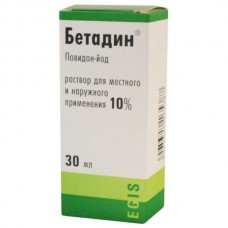Expiration date: 04/2025
Structure and Composition:
Solution for local and external application
1ml contains povidone-iodine 100 mg
Other ingredients: glycerol nonoxynol-9 Citric acid anhydrous disodium hydrogenphosphate hydroxide 10% (w / v) solution of sodium establish pH Purified water
in flasks - PE at 30 and 120 ml in a cardboard box
Description pharmaceutical form:
The solution was a dark brown color, containing no suspended or settled particles.
Pharmacokinetics:
When applied topically hardly occurs iodine absorption.
Description of the pharmacological actions:
Antiseptic and disinfectant. When released from a complex with PVP, in contact with skin and mucous membranes, iodine reacts with proteins yodaminy bacterial cells, it coagulates them and causes the death of microorganisms. It provides rapid bactericidal activity against gram-positive and gram-negative bacteria (except for M. tuberculosis). Effective against fungi, viruses, protozoa.
Testimony:
- treatment and prevention of wound infections in surgery, traumatology, Combustiology, dentistry
- treatment of bacterial, fungal and viral infections of the skin, prevention of superinfection in dermatological practice
- treatment of bedsores, venous ulcers, diabetic foot
- disinfection of skin and mucous membranes in preparation for surgical intervention, invasive studies (puncture, biopsy, injection, etc.)
- disinfection of the skin around the drains, catheters, probes
- disinfection of the oral cavity during dental surgery
- disinfecting the birth canal, while holding the small gynecological operations (abortion, introduction of an intrauterine device (IUD), coagulation erosion and polyp, etc.).
Contraindications:
- Hypersensitivity to iodine and other components of the drug
- thyroid dysfunction (hyperthyroidism) - see section "Special Instructions"
- thyroid adenoma
- dermatitis herpetiformis Duhring
- the simultaneous use of radioactive iodine
- premature and newborn babies.
Precautions: Pregnancy and lactation, chronic renal failure.
Application of Betadine is not recommended with the 3rd month of pregnancy and during lactation. If necessary, in these cases, treatment is possible for the individual medical supervision.
Side effect:
With the frequent use of a large area of ??the wound surface and the mucous membranes may occur systemic reabsorption of iodine, which may affect the functional activity of the thyroid tests.
Hypersensitivity reactions to the drug, (perhaps the manifestation of allergic reactions such as redness, burning, itching, swelling, pain), which requires discontinuation of the drug.
Drug Interactions:
Incompatible with other disinfectants and antiseptic agents, particularly those containing alkali, enzymes and mercury.
The presence of blood bactericidal effect can be reduced, however, by increasing the concentration of the bactericidal activity of the solution can be increased.
Dosage and administration:
For treatment of skin and mucous membranes used in undiluted (for lubrication, a washing or wet compress). For use in drainage systems 10% solution was diluted 10 to 100 times. The solution is prepared immediately before use, dilute solutions are not stored.
Special instructions:
When violations of thyroid function use of the drug is possible only under strict medical supervision.
Use of the drug in neonates is only possible, if necessary, after study of thyroid function.
Caution should be exercised when used regularly on damaged skin in patients with chronic renal failure.
Care should be taken so that a patient may not remain the excess solution. Do not heat before use.
The application site is formed painted film, continuing to release the total number of active iodine, which means the cessation of the drug.
Painting on the skin and tissues is easily washed off with water.
Do not use insect bites, domestic and wild animals.



